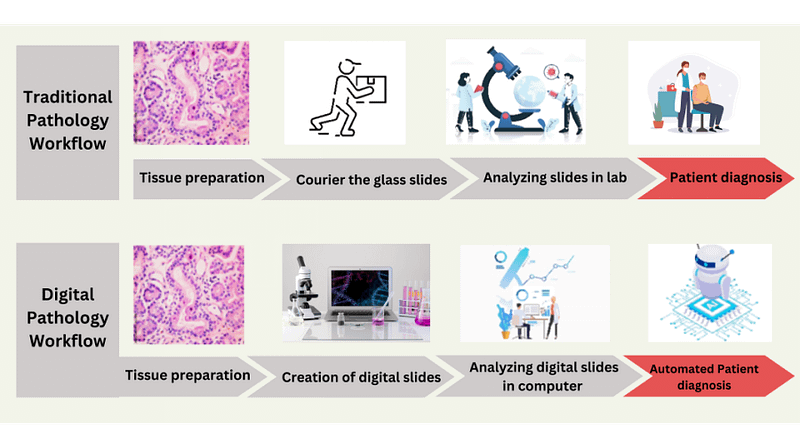Abstract
Recently a colleague of mine attended the 71st Annual Meeting of the American Society of Cytopathology (ASC) in Austin, Texas. The dynamic discussions and transformative insights shared in this gathering of brilliant minds from the field of pathology, further piqued my interest in Digital Pathology. Therefore, this month’s article is dedicated to exploring the significant impacts of digital pathology and how its rapid evolution is reshaping diagnostic approaches. We’ll look at how it is transforming the field, with remote consultations and AI-powered analytics becoming more prevalent. But before we get into that, let’s first get a clear understanding of what Digital Pathology is. Also known as Telepathology and Whole Slide Imaging, it involves creating detailed digital images from tissue sections on glass slides.
By digitizing these traditional slides, we not only enable seamless sharing and accessibility, but we ensure data security and faster analysis. This further promotes global collaboration for research including learning, training and simulation leading to improved medical treatment and outcomes.
More and more pathology departments and researchers are adopting digital pathology for clinical, educational, and research purposes. To achieve successful clinical integration, regardless of your pathology department’s size, there’s a general framework you can use and customize that’s similar to a basic blueprint. In the article, I will present an overview of how telepathology can be transformative and how AI is rapidly enriching and improving diagnostics.
Before delving into the topic here’s a brief description of what happened at the American Society of Cytopathology (ASC) meeting in Austin.
The ASC 71st Annual Scientific Meeting

Did you know that the ASC Society represents the voice of cytopathology? ASC is the premier event in the field of cytopathology. It provides a platform for pathologists, researchers and professionals to exchange ideas and chart the future course of cytopathology.
ASC are providing a multi-year Investigator Grant to fund researchers in cervical cancer screening strategies, implementation of digital cytology, and artificial intelligence. It’s great to see organizations supporting research that could have significant impacts on people’s lives.
ROSEAId was proud to be a part of it, represented by my colleague, Russell Raff, Co-Founder, ROSEAId, Inc. The latest advancements and breakthroughs in the field of Digital Pathology was the central theme captivating the attention of the attendees. As part of the program’s various educational focus, the Diagnostic Cytology Seminar presented top papers in cytopathology. ROSEAId’s collaborative partnership with the University of Texas Health (UTH) also presented its training data and deep-clinical findings, assuring an entirely new phase in the use of AI in medical diagnostics. This powerful platform assists physicians and revolutionizes the colorectal cancer screening process. Attendees were also provided with opportunities to network and explore new research in the field of cytopathology. In general, it was an incredible experience. paving the way for earlier detection, intervention and preventive care.
Transformative Impact of AI on Pathology
In the last article, I discussed how the application of artificial intelligence (AI) is changing healthcare overall and delivering ‘real world tangible value’. We know these days that technology with the implementation of AI is driving healthcare forward, it’s not only about gadgets but also about how technology helps better understand diseases, aiding in earlier detection, diagnosis and treatment. Today, my focus is mainly on pathology, where AI is rapidly reshaping the approach to diagnosis and patient care.
Integrating AI in pathology motivates early adoption it’s because it helps pathologists streamline their clinical day-to-day workflows, enhancing accuracy, efficiency, data quality and patient care. Digital pathology has gained traction as more laboratories leverage artificial neural networks for improved analysis. Despite promising benefits, transitioning from the status quo to that future state involves new challenges and opportunities. Let’s delve further.
Transitioning from Traditional Pathology to Digital Pathology

The integration of digital pathology and AI-based approaches offers significant advantages over traditional methods. Thanks to spatial analysis, the pathologists can effortlessly obtain unbiased and accurate readings from anywhere, unlike traditional methods where tissue sections are examined under a microscope on glass slides. One significant challenge is the evaluation of immune cell staining. Because of the variations in laboratory methods and analysis procedures there can be inconsistency in diagnoses, which affects treatment decisions.
Additionally, moving glass slides incurs high costs, delays diagnoses, compromises security, limits collaboration, and second opinions are difficult because of inefficiencies.
With the advent of digital pathology this practice has been improved. instead of physical slides, digital images are now securely stored on servers, providing the flexibility to view and analyse slides on computer monitors. The file upload process has also been improved, making it faster, easier than ever to add, share and manage files. With features like parallel viewing users can view and analyze two or more files in a single window at the same time.
This feature makes it simple to compare and analyze different versions, increasing work efficiency and faster decision-making. The rise in personalized treatment and disease intervention is revolutionizing the way patients are cared for. In specialized fields such as cancer treatment, it focuses on therapies that meet the specific needs of each individual patient. AI-assisted digital pathology offers numerous benefits especially to the clinical oncology community. Let’s have a look at the various other key benefits.
The Pros and Potential of Integrating AI in Pathology
Earlier detection and improved diagnosis: AI algorithms excel at detecting anomalies and intricate patterns in medical images, allowing for earlier and more accurate diagnoses.
Clinical Workflow Optimization: Prevents glass slides transfers, reduces repeats that leads to delayed treatments. Annotations and reporting are automated reducing workload and allowing pathologists to focus on more complex tasks.
Multimodal Integration: Multimodal integration ensures a comprehensive understanding of patient conditions for decision-making.
Real-Time Support: AI provides immediate assistance, facilitating prompt and effective interventions.
Always Learning and Adapting: Continuous learning and adaptive capabilities ensure AI’s ongoing relevance in evolving medical landscapes.
Global Healthcare Accessibility: AI promotes accessibility on any device from any internet connection, anywhere, bridging gaps in resources and expertise for advanced diagnostics.
Accelerating Drug Discovery: AI expedites drug discovery by efficiently analyzing vast datasets, accelerating the development of innovative treatments.
Although the integration of AI into pathology brings about numerous benefits, it also comes in with its own set of challenges.
Addressing the Key Challenges in Digital Pathology
Hurdles in Data Accessibility
AI algorithms require extensive, high quality labeled datasets for effective training. Securing such data can be challenging in the medical sector, due to privacy concerns, data variability, and the need for expert annotations.
Unclear Policies and Regulations
Pathologists are concerned about personal liability and legal implications with AI diagnostics. Such AI generated diagnoses strictly adhere to regulatory standards and ethical guidelines to ensure patient safety, requiring physician approvals and validations.
Lack of Interpretability
Clinicians who need to trust and comprehend AI-generated results are concerned about the lack of clarity. For example – blurry images due to uneven tissue sample, missing fade tissues and diagnostic equivalence based on images and microscopes needs to be same.
Adversarial Attack
Some artifacts and noise may act as adversarial attacks, triggering incorrect labeling and compromising the accuracy of the Artificial Intelligence. But if the cybersecurity and privacy information are managed properly, it can be avoided.
Despite these challenges, AI in pathology proves to be advantageous and is positioned to evolve significantly, offering enhanced capabilities for disease treatments. The integration of digital pathology, machine learning, and extensive big data acquisition is paving a path toward revolutionary transformation in pathology.
CONCLUSION
AI seamlessly integrates with pathology, like other emerging technologies. It revolutionizes diagnostics, enhancing accuracy and efficiency. Collaborations between AI and medical professionals enable precise analysis, improving disease detection, treatment strategies and better patient outcomes and can take place in real-time.
AI-assisted digital pathology benefits the clinical oncology community, enhancing the identification of genetic mutations, biomarkers, and molecular diagnostics driving cancer discoveries led by advanced technologies and genomic analysis.
ROSEAId, is a cloud-based platform for rapid onsite evaluation of EUS-FNA specimens. It ensures high accuracy and global accessibility to ROSE services globally. It delivers accurate drug effect measurements for trials, ensuring optimal therapies for patients. The collaboration between ROSEAId and UTHS marks a pivotal moment in addressing the critical issues surrounding colonoscopy screenings. With the application of AI in medical diagnostics, ROSEAId empowers physicians to enrich the screening process for colorectal cancer.
If you want to be a part of this revolutionary journey as we tackle pressing healthcare challenges together, we invite you to connect with TurtleBay Advisory Services and explore opportunities to collaborate.
Reference: https://insights.omnia-health.com/technology/ai-driven-precision-medicine-boosts-higher-success-rates-cancer-patients?utm_source=AdWords&utm_medium=Paid+Search&utm_campaign=AEL23OMA-RK-Insights-Dynamic&utm_term=%7Bkeyword%7D&utm_content=Webinar+technology&gclid=CjwKCAiAmZGrBhAnEiwAo9qHiYrV9UWzFNxImD7duNmzc-uwd7zi39IZkCdrAzXORfiaefJspqQWehoCuqgQAvD_BwE https://ascopubs.org/doi/full/10.1200/EDBK_390084 https://cancercenter.ai/new-version/ https://medium.com/the-slalom-daily-dose/digital-pathology-and-ai-an-evolving-conversation-67716a678d4b
Visit us @ https://turtlebaybizbooster.com/ https://turtlebayadvisoryservices.com/ https://www.linkedin.com/company/turtlebayadvisoryservices/?lipi=urn%3Ali%3Apage%3Ad_flagship3_messaging_conversation_detail%3B0mx65kQzRgeGJvFA%2BKUHLw%3D%3D https://twitter.com/TurtleBayAdvise https://www.facebook.com/TurtleBayAdvisoryServices/ https://www.instagram.com/turtlebayadvisoryservices/
* If you have any further questions or want more information about how TurtleBay Advisory Services could benefit your organization, please do not hesitate to book an appointment with us. Contact us at 646-7914511 or sales@turtlebayadvisory.com Visit us @

